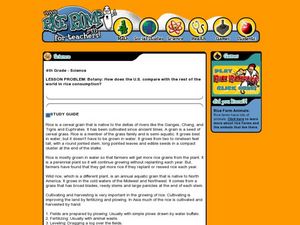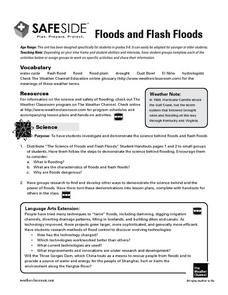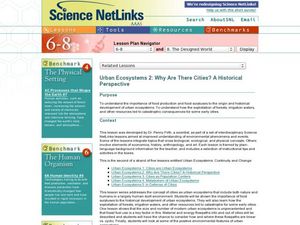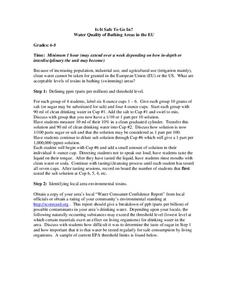Curated OER
Usefulness of Irrigation
Students explore irrigation. In this science lesson plan, students show that water is necessary for plant growth and show how a dam can turn a nearly useless water way into a valuable form of irrigation.
TryEngineering
Irrigation Ideas
Students design and build an irrigation system that can move water from one place to another. In this engineering lesson, students test whether their system can move two cups of water to at least three feet from the source. They evaluate...
Curated OER
Botany: Irrigating of Rice
Fourth graders discover agriculture by researching the irrigation of rice. In this farming activity, 4th graders read about the different methods of rice farming and create an illustration for each different action. Students describe...
Curated OER
Circles in the Landscape: Irrigating Oklahoma Crops
How do you grow crops in a area with insufficient rainfall? Why you irrigate, of course. Class members investigate irrigation systems by designing a system of their own. After examining irrigation related concepts, vocabulary terms, and...
Curated OER
Quality of Rice
Sixth graders research how farmers irrigate, harvest, and keep high standards of rice. For this farming lesson, 6th graders discover how rice, wheat and soy beans are farmed. Students make a chart showing the similiarities and differences.
Curated OER
The First Farmers
Students show how constant irrigation, with repeated evaporation of water that left salts in the soil, eventually ruined much farming land in southern Mesopotamia. They discuss the idea that with the development of irrigation people...
Curated OER
Urban Ecosystems 2: Why are There Cities? A Historical Perspective
Second in a series of five lessons, this lesson encourages preteens to consider cities as urban ecosystems. First, they keep a food diary for a few days. They visit the Natrional Agricultural Statistics Service website for current data...
Curated OER
Why Do We Build Dams?
Young scholars are introduced to a dam and what a dam does. In this dam lesson, students explore how a dam uses water supply, electricity generation, flood control, recreation, and irrigation in order to control the water.
Curated OER
'Water, Water Everywhere...'
Fourth graders explore how the Utah pioneers used irrigation to make the desert 'blossom as a rose'. They use geographical tools to analyze political and physical features of Utah, the United States, China, and Asia.
Curated OER
Water and Rice Agriculture
Second graders investigate the agriculture of rice by reading a study guide. In this food making lesson plan, 2nd graders read about the irrigation of rice fields used for harvesting. Students write three sentences about the rice...
Curated OER
Rice Consumption
Fourth graders discover facts about rice and how it is farmed. In this rice research lesson, 4th graders investigate how much rice is eaten in the United States compared to other countries. Students research countries and graph the...
Curated OER
Desert Dwellers
Students study deserts and how they occur. In this desert lesson students research deserts and desertification then divide into groups and come up with an action plan to help rehabilitate these areas.
Curated OER
Ag in My Community; Agriculture
Learners build knowledge about agriculture as it relates to their communities' commodities. In this agriculture instructional activity, students brainstorm about conditions in their community with regards to growing different types of...
Curated OER
Wildlife Sampling
Seventh graders discuss water issues and its affect on salmon population. They recreate a sampling river with fish (cheddar) and scoop them to tag them (which means they exchange them for pretzel fish.) They complete a spreadsheet to...
Curated OER
Wheat: Ancient and Ageless
Sixth graders investigate the role of wheat in society. In this Social Studies lesson, 6th graders explore wheat production from ancient civilizations to modern times. Students describe wheat's importance in shaping culture.
Curated OER
Water Cycle
In this water cycle worksheet, students answer questions about the water cycle using a word bank. Students label a diagram of the water cycle.
Curated OER
Four Ancient River Civilizations
Students explore how the environment shapes man, how man transformed his world, nd how art became part of the human process. The group is divided into clans and their migratory routes developed in the eight lessons of this unit.
Curated OER
Florida's Springs
Students calculate the water usage for irrigation of school grounds. They use maps in determining which areas are irrigated.
San Francisco Public Utilities Commission
Recycled Water: A Smart Way to Reuse Water
Learn about wastewater and recycled water with a science reading activity. After learners finish a two-page passage about conserving the water supply, they answer six comprehension questions about what they have read.
Curated OER
The First Farmers
Students investigate how constant irrigation, with repeated evaporation of water eventually ruined farm land in southern Mesopotamia. They discuss the development of irrigation.
Curated OER
Floods and Flash Floods
Junior geologists, hydrologists, or meteorologists simulate what happens during the flooding of a river and demonstrate factors that contribute to flash flooding. This outstanding resource provides a vocabulary list, online resources,...
Curated OER
Urban Ecosystems 2: Why Are There Cities? A Historical Perspective
Students investigate the importance of food surpluses to the historical development of urban ecosystems.
Curated OER
Hydroponics
These attractive, clear slides summarize hydroponics. They cover details concerning nutrients, solutions, flooding issues, media types, and commercial use.
Curated OER
Is It Safe to Go In? Water Quality of Bathing Areas in the EU
Using your senses, apprehend the effects of contaminants in water. With a global focus, young scientists conduct a safe experiment by tasting sugar and salt water with different dilutions. After reviewing threshold limits, learners write...
Other popular searches
- Irrigation Mesopotamia
- Ancient Egyptian Irrigation
- Irrigation Sumer
- Basin Irrigation
- Early Irrigation
- Irrigation Systems
- Irrigation and Fertilizer
- Irrigation in Egypt
- Ancient Irrigation
- Drip Irrigation
- Irrigation Egypt
- Egypt and Irrigation

























